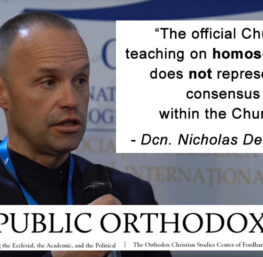OrthodoxyToday.org | Bp. Hilarion (Alfeyev) | Mar. 3, 2009
When you pray, go into your room and shut the door and pray to your Father Who is in secret; and your Father Who sees in secret will reward you. And in praying do not heap up empty phrases as the Gentiles do; for they think that they will be heard for their many words. Do not be like them, for your Father knows what you need before you ask them.”1 These words of Christ may provoke the following question: What is the sense of praying if God knows beforehand what we actually need?
In answering this question, one should remember that prayer is not just a request for something; it is first of all an encounter with Someone, a dialogue with the living God. “Prayer is communion of the intellect with God,” according to a classic definition by Evagrius the Solitary.
In prayer we encounter the personal God Who hears us and responds to us, Who is always ready to come to our assistance, Who never betrays us, even if we betray Him many times. In prayer we communicate with the sublime Reality which is the only true Life: compared to it, every other reality is partial and imperfect. Life without communion with God, without prayer, is but a long pathway towards death, a gradual dying. We live insofar as we participate in God, and we participate in God through prayer.
Why does Christ command us to avoid verbosity in prayer? Precisely because it is not out of words that prayer is born: prayer is not merely the sum of our requests addressed to God. Before being pronounced, prayer must be heard within one’s heart. All true masterpieces of music and poetry were not simply composed out of disconnected letters or sounds: they were first born in the depths of their authors’ heart, and were then incarnate in words or musical tones. Prayer is also creative work, born not from verbosity, but out of a deep stillness, out of concentrated and devoted silence. Before embarking upon the path of prayer, one must inwardly fall silent and renounce human words and thoughts.
The human person’s heart, mind, mouth, and senses fall silent, when he is plunged into the waves of prayer. Words, sounds and worldly impressions disappear from his heart; his face is bowed to the ground, when he encounters God in the deepest stillness of his heart. “Intelligent silence is the mother of prayer,” says St John Climacus. “The friend of silence draws near to God and, by secretly conversing with Him, is enlightened by God.”3 Metropolitan Kallistos of Diokleia says:
To achieve silence: this is of all things the hardest and the most decisive in the art of prayer. Silence is not merely negative — a pause between words, a temporary cessation of speech — but, properly understood, it is highly positive: and attitude of attentive alertness, of vigilance, and above all of listening. The hesychast, the person who has attained hesychia, inner stillness or silence, is par excellence the one who listens. He listens to the voice of prayer in his own heart, and he understands that this voice is not his own but that of Another speaking within him.4
Like every conversation, prayer is a dialogue, and its aim is not only to express oneself but also to hear Another.
“Silence is a mystery of the age to come, but words are instruments of this world,” says St Isaac the Syrian.5 In order to attain silence and stillness, monks deprived themselves of encounters and conversations with people, departed to deep deserts, hid themselves in mountains and woods.
[…]
An experience of stillness is essential for every person who wants to learn the art of prayer. To achieve this experience, one should not necessarily withdraw to the desert. But one has to put aside some minutes every day, go into one’s room, “shut the door and pray to God Who is in secret.” Our usual temptation, or deception, is that we are always very busy and forever rush to do something extremely important: we believe that if we spend too much time in prayer, we will not have the opportunity to do these important things. The experience of many people shows that half an hour spent in prayer seldom affects our “business” negatively, in spite of our initial concerns. On the contrary, prayer teaches one to concentrate more to make one”s mind more disciplined: as a result, time is won rather than lost.
The lack of taste for solitude and silence is one of the most common illnesses of the modern person. Many are even scared of remaining in stillness, being alone or having free time: they feel more comfortable being constantly occupied; they need words, impressions; they always hasten in order to have the illusion of an abundant and saturated life. But life in God begins when words and thoughts fall silent, when worldly cares are forgotten, and when a place within the human soul is freed to be filled by Him.
[…]
. . . more



